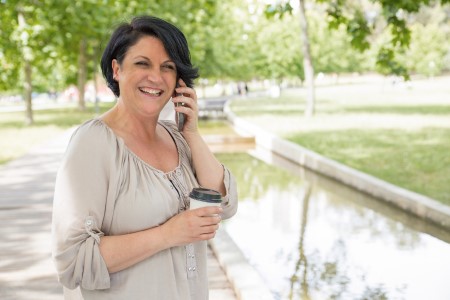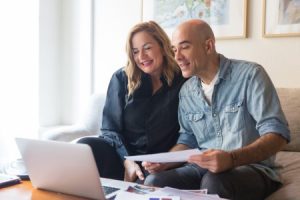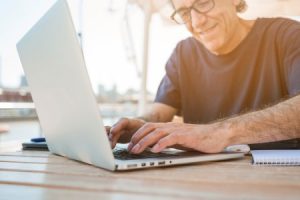The COVID-19 pandemic has deeply affected the way we live.
The consequences of these enforced changes may continue indefinitely, so it’s important for all of us to maintain both our physical and mental wellbeing.
During these challenging times, making financial decisions can also be overwhelming.
Many people are feeling anxious about their financial future, so it’s important you take some time to take stock of your financial position and assess what you can do to feel more in control of your situation.
Whether it’s setting up a budget, putting aside money towards an emergency fund, looking for improved cost savings or getting professional advice: taking action to improve your financial wellbeing is a great first step.
Budgets, rainy days and advice
Michael Csavas, General Manager, Personal Financial Services at Australian Unity, says one of the first and most important steps to improving your financial wellbeing is to have a budget in place.
“Cashflow analysis and budgeting will really help you understand what you are spending each month, as well as any surplus you may have,” he says.
“It’s so important to have a budget – if you fail to plan you are planning to fail. Without visibility and understanding of your spending habits this will be difficult. If you need assistance with this, it’s a good idea to seek some financial advice to help organise your financial affairs and get across your financial situation.”
But it’s not just about budgeting – making contingency plans such as savings or a rainy-day fund will also help ease financial anxieties.
A rainy-day fund will allow you to set aside money to cover urgent or unexpected costs. This could be an urgent medical bill, car repairs, or any other kind of unforeseen costs.
Even if you can only save a little bit at a time, make a start and keep working at it. The more you can regularly save, the better off you’ll be. An ideal goal is to have enough saved in your emergency fund to cover three months’ worth of expenses.
By having such an emergency fund, you’re providing a financial safety net if something happens to you or your family.
“Once you are aware of your earnings and spending habits, adopting an approach where you divide your earnings into buckets may allow you to set up for contingencies,” Michael says.
“A financial adviser may be able to assist with budgeting as well as helping you with personal insurance and superannuation accumulation and retirement goals.”
Staying healthy, both physically and mentally
Dr Nancy Huang, Australian Unity’s Chief Medical Advisor, says in these challenging times, making sure our mental and physical health is maintained is crucial.
“For most of us, our lives have been turned upside down during this crisis,” she says.
“We can see ourselves, our family, friends, colleagues, neighbours and community affected in different ways.
“While it might be normal to have concerns and anxieties during this period, it can also take its toll, so it is really important that we take the time to care for ourselves, and to be aware of its impacts on our friends, family and colleagues.”
There are a number of things we can do to look after ourselves mentally and physically. Some of the immediate things to start with are:
- Stay connected– being in touch with family, friends and colleagues is important, even when we continue to observe physical distancing and lockdown rules. This can be via phone, video call, or meeting briefly face-to-face while maintaining a 1.5m distance.
- Be informed– having up-to-date information from credible sources about COVID-19 is critical in this environment when events are changing quickly. Make sure you have a few trusted sources of news that are supported by reputable organisations such as government or public health units.
- Maintain a positive outlook–This includes setting up daily routines and planning fun activities into your day (such as reading or other hobbies). Understand that this crisis will pass and wherever possible, when you notice negative thoughts, consider how these may be seen in a different light and become more helpful or realistic.
- Eat healthily– enjoy a wide variety of nutritious foods, with lots of fruit and vegetables and limit fast foods or snacks. With more time at home, it is useful to plan meals, shop regularly (rather than frequently) and freeze leftovers for use later.
- Exercise regularly– this is absolutely critical for your wellbeing. Reducing sitting time and maintaining regular moderate intensity activities for at least 30 minutes each day is essential.
- Drink responsibly– while alcohol may help some people relieve their experience of anxiety and stress, especially in isolation, this method of coping can make the situation worse. It is especially important during these time that we drink alcohol in moderation.
- Know where to get more help if you need it. Invariably, things can get on top of us. It is important to recognise that’s it’s ok to ask for help. For more information, head to our members’ COVID-19 information page here.
Important information
Originally published by Australian Unity Personal Financial Services Limited ABN 26 098 725 145 (AUPFS), AFSL 234459 on 17 July 2020. Its contents are current to the original date of publication only, and whilst all care has been taken in its preparation, AUPFS accepts no liability for errors or omissions. This report is general in nature and does not take into account the objectives or circumstances of any particular individual or entity. It cannot be relied upon as a substitute for personal financial, taxation or legal advice.
Information provided in this article is not medical advice and you should consult with your healthcare practitioner. Australian Unity accepts no responsibility for the accuracy of any of the opinions, advice, representations or information contained in this publication. Readers should rely on their own advice and enquiries in making decisions affecting their own health, wellbeing or interest.



